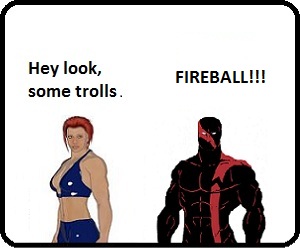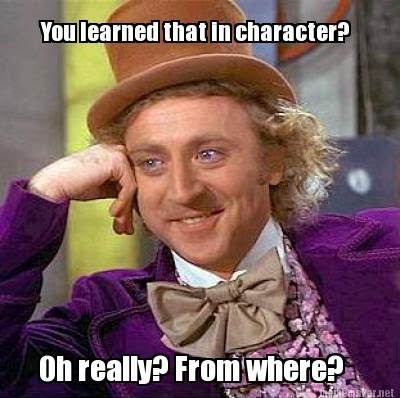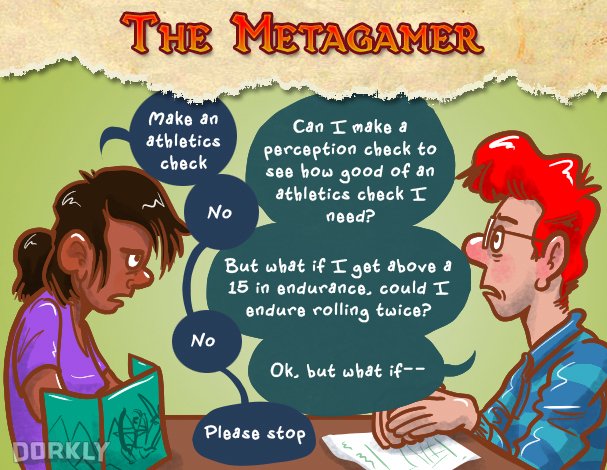Hello everyone, after a recent discussion with my group I have been thinking about one of the age old D&D debates, Character Knowledge vs. Player Knowledge, also known as Metagaming.

What is metagaming?
Before i begin discussing my thoughts I am sure some people are wondering what do this mean and how does it matter. Basically it is inevitable that some player(s) will have knowledge that their character may or may not possess.
Often, it is the grizzled veterans who run into this the most. After years or decades playing, it is tough to not to have parts of the Monster Manual memorized, especially for those players that also DM. This can manifest itself in a character utilizing the perfect strategy against a monster, despite the fact that the party has never encountered it. Or it could even take place during character creation, for example if the players know they are entering Castle Ravenloft they may spend extra money to purchase silver weapons, because the players, but not the characters, know undead will be their main enemy.
Grizzled vets may also have played an adventure already, if you are using a prewritten adventure. For example, one of my Dad’s and his group’s favorite adventures is Keep on the Borderlands, they have played through it dozens of times. This means that they remember, without investigating, what most of the caves hold, and which ones to go in first, for big rewards. It also means that some of the false rumors in the book don’t have the same impact, as they know the rumors are false.
New players could also have this happen. Perhaps the best example from either vets or new players is when a Rogue rolls a Natural 1 to search for traps, suddenly everyone is either hesitant to open the door, or also asking to search themselves!

Why metagaming is a problem?
I could go on longer, but I think it’s pretty clear what I mean by Character Knowledge vs. Player Knowledge.
Now, some people may be wondering, why is this a problem? Characters metagaming can have several negative impacts on the game. Metagaming can disrupt the immersion of the game. Metagaming can turn what would be an exciting encounter against a new monster, into a cake walk, as players use abilities to take advantage of monster weaknesses that they learned in another game, with another character. Finally, metagaming can really bog down game play, as people attempt to bully, argue, or reason their way into characters doing things that just doesn’t make sense for the character.

I have played with players who try stunts like this, it is fun for no one.
As a players, how can I avoid metagaming?
Avoiding metagaming; however, does not mean that players cannot use their own logic, problem solving, and even personal knowledge.
Most player knowledge actually makes sense for characters to possess. Even the dumbest fighter would have heard that goblins are cowardly, ogres are strong but dumb, and that vampire drink blood. It is not even outside the realm of possibilities that most characters have heard that trolls are weak to fire, after all trolls are not that uncommon, and vanquishing adventures would love to spread stories of their conquests.
Think of all the various pieces of knowledge and trivia we possess about our own world, your own characters will have at least that much, most likely more, as they, unlike most of us, have been out wandering around, facing dangers, and testing their skills along their journey to be adventures.
I often find someone stopping and discussing whether or not their character would know X or Y is actually just as disruptive as just using the knowledge.
So where does the line between playing smart and metagaming lay? Honestly there is no black and white divide, smarter characters will know more about their world, while survivalist will obviously have large stock piles of info on the natural world. I find that the best way to avoid metagaming is to think a little bit about your character’s background. Where did they grow up? Who raised them? What did they do before their adventuring career?
These questions help supply context of what knowledge your character possesses, which will help you avoid metagaming. For example, if I am playing a Human Wizard, raised in a city his whole life, chances are he does not know what poison ivy looks like; however, his time studying books should allow him to know that ghouls are a form of undead with paralyzing touch, as they are a pretty common threat. What age a Red Dragon begins casting certain spells; however, is much rarer knowledge, that this character most likely does not possess. This is when a DM may require researching it in game, or a knowledge check. After all, dragons are rare creatures, and information that specific rarer still.
Using this method can also help you think about what knowledge your character may possess, that you yourself do not. This is where die rolls, with specific goals come in. For example, I really enjoyed playing a country priest, who had knowledge of farming and healing. When presented with some uncommon plant growth I asked the DM if I could examine it and use my knowlege nature skill to gain some knowledge on it. I myself would have no idea about various patterns of plant growth, but my characters did.

What tools does a DM have to stop metagaming?
The biggest deterrent for metagaming is perhaps unsurprisingly the DM.
Some DMs I have talked to set hard and fast rules about what players know and what characters do. They are concerned about stopping players from metagaming, and have discussions about it when it pops up. This style emphasizes putting the responsibility on the players to not metagame.
While this isn’t a bad strategy, I think there are a few tips I can give that will quickly deter instances of metagaming. My style tweaks the game in slight ways from time to time, that makes metagaming knowledge less valuable. My players know this, and so often are focused on information in the game, rather then their stockpile of experience, to overcome challenges. Here are some of my tips:
- As the Dm feel free to tweak or change pre-written adventures or monsters. Maybe this particular tribe of orcs is very skilled in magic, but not as physically strong. Perhaps you switched the occupants of a cave in Keep on the Borderlands. Subtle changes like this can keep a party of players on their toes, while also continually discovering new things in the world, always a fun experience. When tweaking common monsters like orcs, goblins, kobolds, ect. I suggest before the end of the adventure supplying some logical reason they were different. In the orc example, maybe their leader is a ancient wizard, who uses them for his own nefarious purposes and as apprentices. If you do this players will go into your adventures with some basic knowledge; however, they will also constantly be aware that threats could be different then expected. Don’t switch this up too frequently, as you want most common monsters to stay that way, common and basic.
- When appropriate, ask a player to roll something hidden, or do the roll yourself. This heightens tension and excitement for the rest of the players. If a player is attempting to mentally reason whether their character would be worried or not, the impact of a scare, threat, or trap will be lessened. Keeping the knowledge hidden until it happens removes this problem.
- Encourage and allow opportunities for interested characters to research villains, religions, rare monsters, or frequent threats. By doing this, you are giving an outlet for their curiosity and desire to equip their characters with tools to face threats. This can also be a great chance to bring in elements of the story plot that might otherwise not be clear to the party. You can also charge money and time for their research, which is an excellent chance to relieve players of their vast piles of loot.
- Finally, be firm, fair, and consistent with players. Don’t get into arguments of logic or reasoning, just make a ruling, and continue on with the game. If you do this in a consistent and fair way, the game will move on fine, and most players should be fine with it. If you keep having problems with a player, consider talking to them, or even not inviting them back.
Those are my thoughts on player knowledge vs character knowledge, what are your thoughts on it? Have you had any instances where this has really impacted a game?
